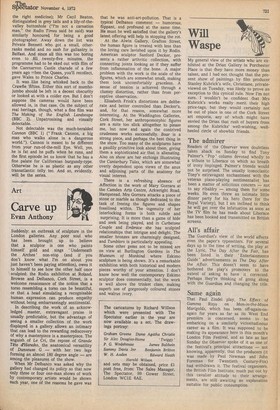Will Waspe
My general view of the artists who are exhibited at the Drian Gallery in Porchester Place is that they have more money than talent, and I had not thought that the present show of paintings by film producer Stanley Kubrick's wife, Christiane, privateviewed on Tuesday, was likely to prove an exception to this cynical rule. Now I'm not sure. I wouldn't be confident that Mrs Kubrick's works really merit their high price-tags, but they would certainly not be out of place in one of the Cork Street art emporia, any of which might have envied the Drian that rush of buyers from among the Kubricks' well-wishing, wellheeled circle of showbiz friends.
The admirer
Readers of the Observer were doubtless taken aback on Sunday to find Tony Palmer's 'Pop' column devoted wholly to a tribute to Liberace on which no breath of irony impinged. Palmer's friends would not be surprised. The usually iconoclastic Tony's extravagant enchantment with the veteran piano-playing sentimentalist has been a matter of solicitous concern — not to say ribaldry — among them for some weeks. He even threw an intimate little dinner party for his hero (here for the Royal Variety), but I am inclined to think he will get over the infatuation as soon as the TV film he has made about Liberace has been booked and transmitted on British screens.
All's affair
The Guardian's view of the world affects even the paper's typesetters. For several days up to the time of writing, the play at the Lyric, The Day After the Fair, has been listed in their Entertainments Guide' advertisements as The Day After the Affair. This doesn't seem to have bothered the play's promoters to the extent of asking to have it corrected. Perhaps they're thinking of going along with the Guardian and changing the title.
Same again
That Paul Zindel play, The Effect of Gamma Rays on Man-in-the-Moon Marigolds, which has been off-again-onagain for years as far as its West End premiere is concerned, seems to be embarking on a similarly vicissitudinous career as a film. It was supposed to be making its appearance here in this month's London Film Festival, and as late as last Sunday the Observer spoke of it as one of the festival's principal attractions — not knowing, apparently, that the producers (it was made by Paul Newman and John Foreman for Twentieth Century-Fox) had withdrawn it. The festival organisers, the British Film Institute, much put out by this cavalier attitude to their arrangements, are still awaiting an explanation suitable for public consumption.








































 Previous page
Previous page